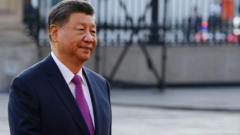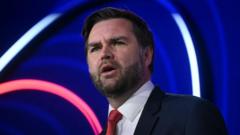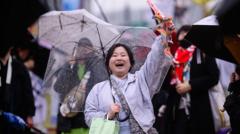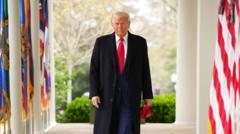In light of the latest stock market plunge, key Trump advisers assert their commitment to implementing new tariffs amidst growing global tensions.
Trump Administration Stands Firm on Tariffs Despite Market Backlash
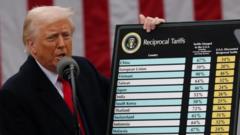
Trump Administration Stands Firm on Tariffs Despite Market Backlash
Officials remain resolute amid turmoil; international negotiations begin to unfold.
US President Donald Trump's key officials doubled down on their approach to tariffs following sweeping declines in the stock market, rejecting calls to avert a potential trade conflict amid widespread investor concern. During recent interviews, Treasury Secretary Scott Bessent dismissed fears of an impending recession linked to market instability, asserting, "This is merely an adjustment," while Commerce Secretary Howard Lutnick reiterated, "Tariffs are definitely on the way."
On Friday, all three primary stock market indices in the United States fell more than 5%, marking the most challenging week since 2020, with the S&P 500 experiencing a nearly 6% dip. Notably, Saudi Arabia's stock exchange saw a dramatic drop of nearly 7%, reported state-run media, the most significant one-day loss since the onset of the pandemic.
In response to the fluctuations, Lutnick emphasized in an interview with CBS News that a 10% baseline tariff on all imports, which took effect just a day prior, is here to stay for the foreseeable future. Furthermore, higher tariffs targeting about 60 countries, labeled as "worst offenders," are set to commence on April 9.
Bessent also highlighted that Trump's strategies have positioned him to negotiate from a place of strength, noting that over 50 nations have approached the administration to discuss lowering trade barriers and adjusting tariffs. His colleague, Kevin Hassett, echoed this sentiment, yet specifics about the contacting countries remained undisclosed.
On a diplomatic front, Indonesia and Taiwan have opted not to retaliate against the US's new tariffs, while Vietnam has reached out, requesting a delay on a 46% duty on its exports to America. Meanwhile, China indicated it would impose a 34% tariff on all US imports beginning April 10.
UK Prime Minister Sir Keir Starmer lamented that "the world as we knew it has changed," maintaining that the UK government would seek an economic agreement with the US that mitigates tariffs. Following a conversation with Canada's new Prime Minister Mark Carney, Starmer stressed the lack of benefit from an all-out trade war.
On the horizon, Israeli Prime Minister Benjamin Netanyahu is set to meet Trump for trade discussions—a meeting seen as a testament to their enduring partnership. However, domestic opposition to Trump's tariff policies has surged, culminating in protests across multiple US cities, alleging a wide array of grievances against the administration's economic decisions.
As Trump commands the nation to "hang tough" in the wake of recent turmoil, the spotlight now turns to how Asian markets will respond when they resume trading on Monday. The repercussions of Trump's tariff strategy may continue to reverberate through the global economy in the coming weeks.

